How a single mother turned her backyard into a thriving business for unusual plants
Melisa Hanson’s business, Baby Mama Botanicals, is unique on many levels.
She single-handedly grows and tends 12,000 plants each year in the half-acre yard that surrounds her Milwaukee home, in her neighbor’s backyard, and in a small plot of land her parents own near Holy Hill.
To create a niche market, she grows unusual plants − both decorative and edible − from seed from around the world.
She sells her produce to area restaurants but also to Milwaukee Farmers United, a firm that lists her goods on its site and sells for her. She also sells starter plants each spring to people who have come to know about her business through word-of-mouth.
It’s a venture she started about 19 years ago while living in Colorado, and one she has been nurturing since she moved to Milwaukee in 2006 − despite roadblocks that have made it difficult at times.
“I was living in Colorado as a single mom, and that’s where I started farming. I built a greenhouse and started taking produce to farmers markets to sell. I would go to the farmers market with my son in a backpack,” she said.
Then she sold cut flowers, herbs, salad greens and soap.
A science and English teacher, she taught and had a small garden when she first moved to Milwaukee. Then in 2011, while pregnant with her daughter, she became certified as a clinical master herbalist through an online course from the Natural Healing Institute in Encinitas, California, and started a line of body care products. She also began growing produce on a larger scale.
“The body care products were all geared toward moms and babies. I made things like Healing Calendula balm for dry skin, chapped lips, sunburn, diaper rash, bug bites, fresh tattoos and more. I also had garlic and mullein ear oil for ear infections. A lot of the various balms were designed for my kids. They were products I was using on them and myself,” she said.
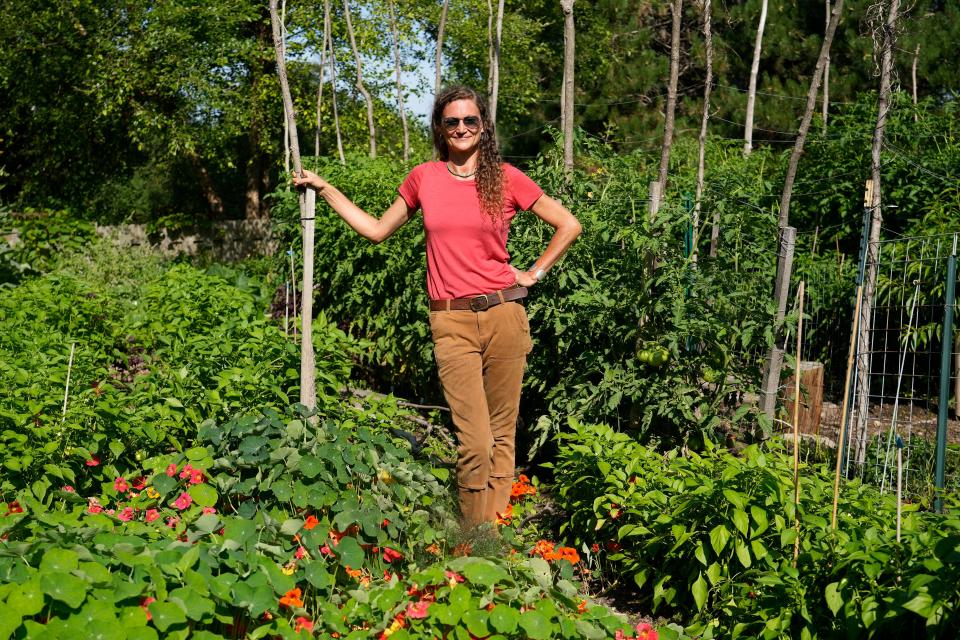
After her daughter was born, she quit teaching as holding down both jobs became difficult because of serious health problems that started when she was living in Colorado.
“I was really sick with Lyme disease. I went undiagnosed for over a decade because I had symptoms that affected my heart, immune and nervous system. I had a fever of unknown origin almost every month for years, and symptoms kept spiraling until I couldn’t work or drive anymore,” she said.
To support herself and her family, she began waiting tables and hosting at Odd Duck restaurant, and returned to farming on an even larger scale as she could do these jobs when her health was good.
In 2017, after being treated for two years, she recovered, and she has been going full speed ahead ever since.
She now grows all her plants from seed in a 10-by-22-foot greenhouse. She sells about half of them as starter plants to home gardeners or to restaurants or Milwaukee Farmers United. The other half feeds herself and her children.
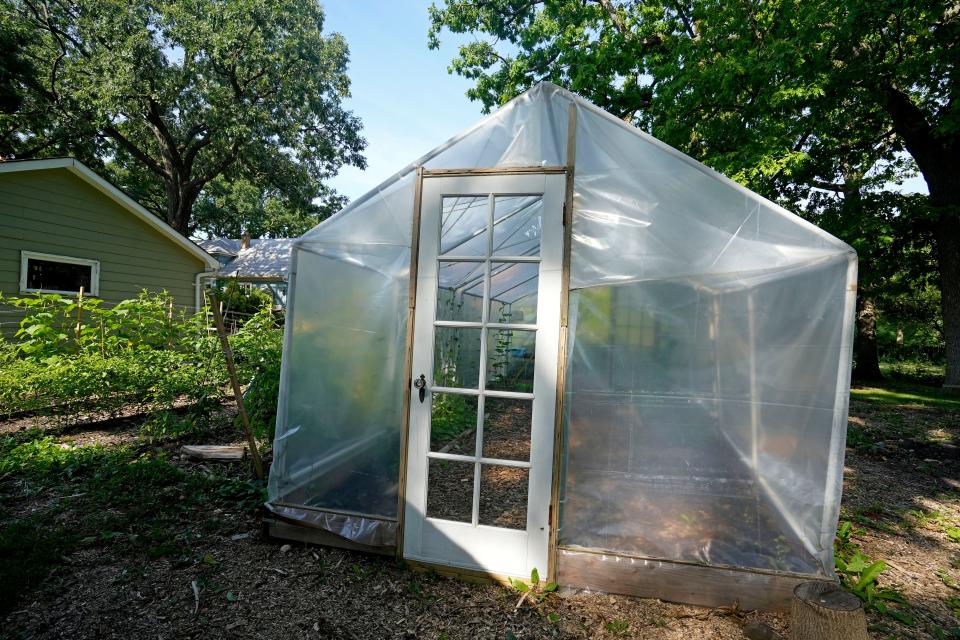
She starts growing her plants in March, and begins selling them by about mid-May. By June her starter plants are all sold, but she continues to sell her produce to restaurants until the season is over, which is usually by November. After that she starts working on cleanup and maintenance on her property and on promoting her products.
“I’m repairing my tools and going over my books and evaluating what seeds I need. I do an overview of the season. Winter is also the time when I sell the body care products and edible flowers I produce throughout the winter in a grow room in my house. I’m pretty much farming 11 months of the year in some capacity.”
She said restaurants seek out her produce because it’s grown without chemicals, is unique, and because she can get it to them quickly.
“I’m not certified organic. I have no interest in dealing with that bureaucracy. My practices have surpassed organic practices. I use no pesticides whatsoever. There are many organic-approved pesticides, but I don’t touch them. I primarily focus on making sure I have microbial-rich and nutrient-rich soil. If you have healthy soil, you have healthy plants," she said. "And because I live so close to so many restaurants, I can harvest my products very quickly and sometimes get them to the businesses within hours."
She noted how the other day Braise contacted her with an order for a variety of unique produce including bronze fennel blossoms, epazote, poblanos, lemon spice jalapeños, purple and white eggplants, Lemon Sun patty pan squash and artisan tomatoes. Within hours, she harvested and delivered them.
“And last night after the temperature dropped a bit, I picked six kinds of garnishes in four colors; blue, white, yellow and peach, to go along with the Mediterranean themed dinner Britta Kramer, owner of Private Palate, was giving. She picked them up this morning for her event today.”
Hanson recently talked about her business.
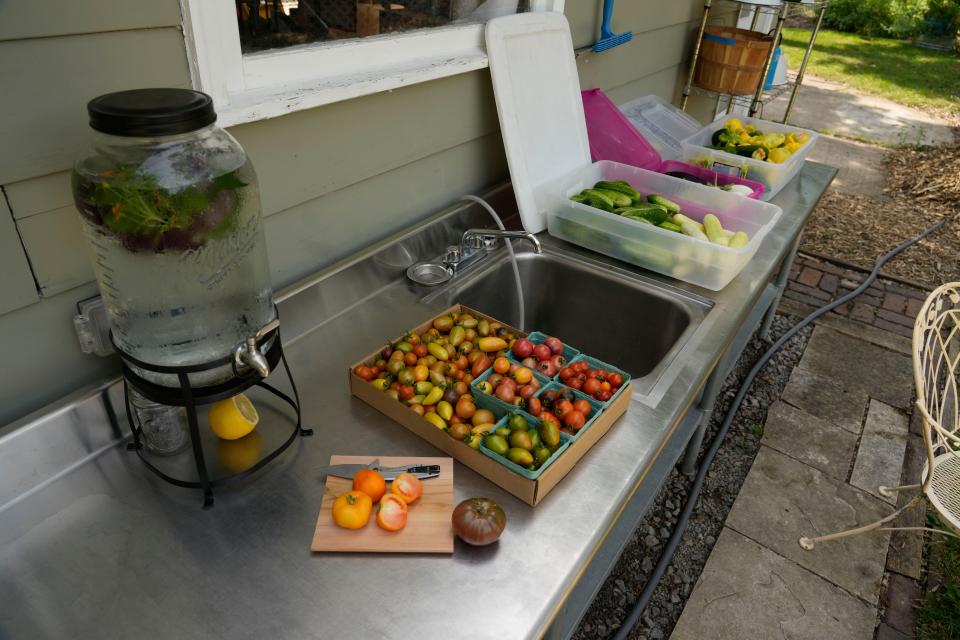
How did you come up with the name for your business?
I initially came up with Baby Mama Botanicals as the brand name for my line of health and body care products. Many of the products I developed were ones I had used for myself and my children.
At that time I was also working at Odd Duck and they hired me to do weekly flower arrangements for their tables and they started buying my produce and foraged items. I also did cut flowers for special events and weddings, so botanicals in my name seemed to encompass the breadth of my skills and services.
The term "baby mama" not only refers to the products that were developed for mamas and babies but also my journey as a single mother, working with my babies in tow. I have a partner now, but I take a lot of pride in my years as a single mom hustling all things botanical.
You’ve gone in many different directions in your business over the years. Why is that?
I’ve narrowed my focus. I wanted to do the things I knew I could do well on my own.
What are some of your more unusual plants?
Blue Monday clary sage, which is a medicinal and ornamental plant with bright blue flowers; Chinese pink celery that’s a bubblegum pink color; dragon tongue beans, which is an heirloom wax bean that’s pale yellow with purple streaks; Chinese red noodle beans that get 18 to 24 inches long and look like giant ropes of licorice; and purple Shiso, a sweet earthy herb that looks similar to basil and is used as a garnish or as a flavoring in salad dressing or marinades.
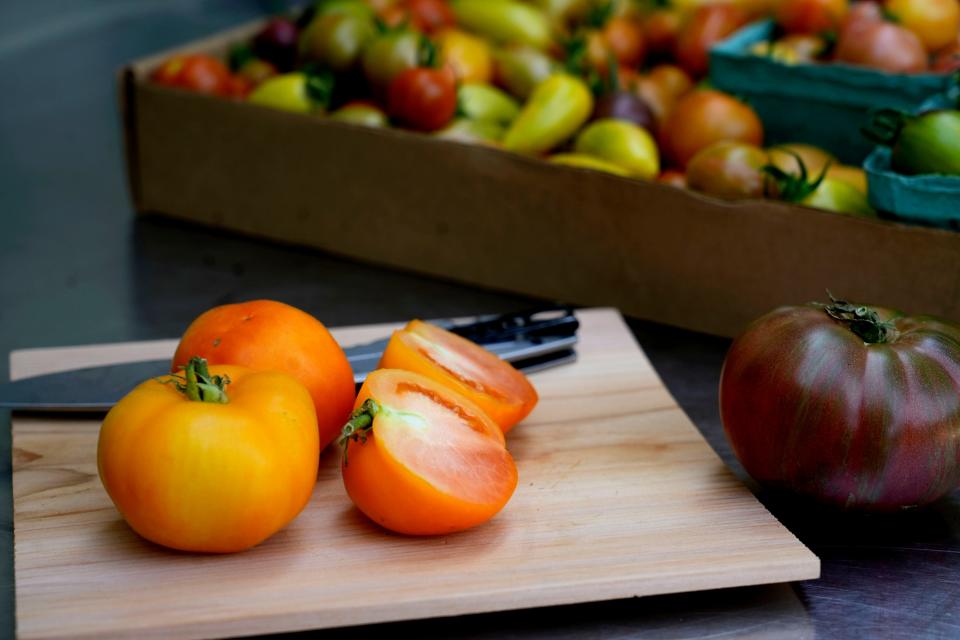
What are your most popular plants?
One thing people really come to me for are my heirloom and artisan tomatoes. I grow different ones every year. One of the more popular heirloom tomatoes is Brad’s atomic grape tomato. It’s really popular, so I offer it every year. It’s a grape tomato that starts out green, then gets lavender and purple stripes that turn to technicolor olive-green, red, and brown-blue stripes when fully ripe. It’s a real jazzy-looking tomato.
What are some of the products area restaurants might buy from you?
Goodkind in the Bay View neighborhood uses my heirloom tomatoes, and they buy my starter plants to use in their landscaping then later as garnishes. Amilinda in Milwaukee buys my edible flowers, Argentinian avocado squash and lovage. Flour Girl & Flame in West Allis uses my edible flowers, tomatoes and spicy peppers in their pizzas. Braise Restaurant & Culinary School might buy my bronze fennel fronds or blossoms, salad greens and avocado squash. The Pasta Tree buys my salad greens, garnishes, heirloom tomatoes and squash blossoms.
More: From Goodkind to Golden Nest, area restaurants are using flowers as more than garnishes
Do you ever get ideas from the chefs who buy from you?
I give them ideas, and they give me ideas. I’ve also worked with mixologists to come up with unique cocktails.
How did you meet all the food professionals you work with today?
When I worked at Odd Duck for about eight years, I built relationships with some of the best chefs in the area and their mixologists or bartenders. I also learned a lot about food in general from owners Ross Bachhuber and Melissa Buchholz.
How many kinds of tomatoes and nasturtiums do you grow?
More than 40 varieties of heirloom and artisan tomatoes. I grow them in two areas at the back of my property and in my neighbor’s backyard. I call those areas tomato alley. I grow a half dozen varieties of nasturtiums.
How many tomatoes do you harvest every year?
Last year I was doing 60 to 80 pounds a day. This year I am anticipating close to 50 pounds a day at peak. I’ll probably be harvesting over the course of three months. Last year I had 400 tomato plants. This year I have 300.
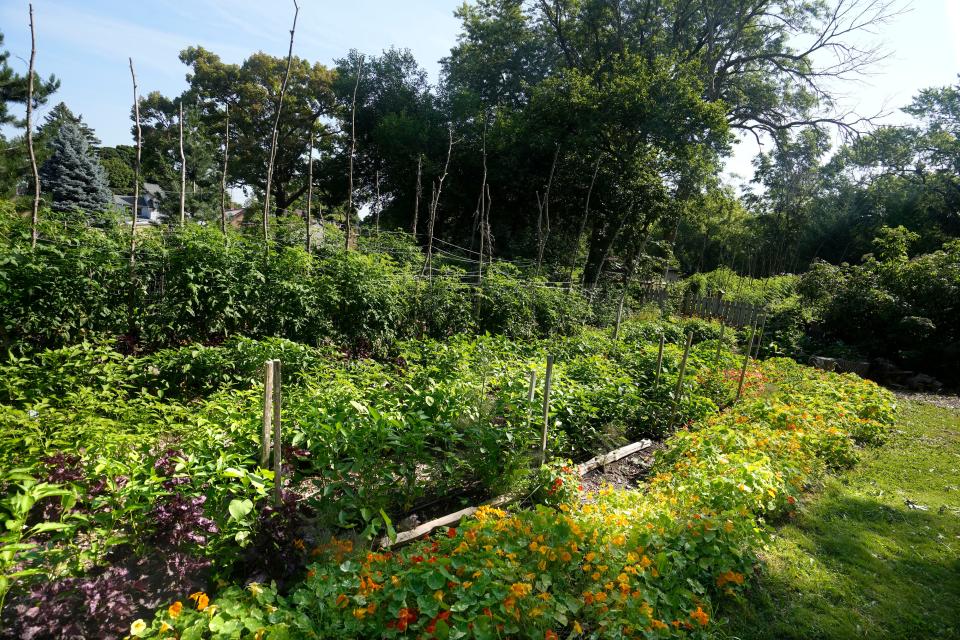
How do you keep all these plants watered?
I use irrigation tubing for farms. It’s target irrigation. I don’t like to use overhead sprinklers because water on the leaves can cause diseases and it also evaporates, so it’s wasteful and not as efficient. I put the plants where the water comes out and it goes right to the roots.
How did you get such great soil?
Well over 100 yards of compost has been added to the property in the last eight years. I now use biodynamic compost. It surpasses regular organic compost when it comes to quality standards. I try to amend the soil with that every year. I also add wood chips. It’s a foot thick between the plants. I get it free from area arborists.
How would you describe your style of agriculture?
Biointensive is the style of agriculture that most closely describes my practices. By creating nutrient-dense soil and healthy ecology, I can practice more intensive plant spacing and increased yields per square foot. I also take advantage of vertical growing and trellis tomato and cucumber plants to over 12 feet tall. I have to harvest the produce by ladder. My rows are also very close together, and you have to be a ninja and extremely flexible to maneuver and harvest.
I also draw a lot of inspiration from permaculture and have incorporated those principles into my design. Eventually, I hope to have this place looking like a food forest with perennial food plants, fruit trees, and berry bushes incorporated among the annual vegetable and fruit plantings. We already have arctic kiwi, several kinds of currants, gooseberry, jostaberry, apple, plum and peach trees as well as about 50 perennial edible and medicinal plants.
How do you clean and store your produce?
I have a large washing station to rinse off my produce and an industrial-sized refrigerator.
How can consumers buy your plants?
They place an order through my website (babymamabotanicals.com), where they can schedule a pickup time. Usually the website goes live by the first week in April, but the plants don’t go out until after we know we are past the last spring frost. That’s usually around May 15. I list my starter plants on the site, but by this time of year I no longer have starter plants, so I use it to showcase products and prices.
What goals do you have for your business?
Over the years I’ve expanded at a very slow rate, have never taken out a business loan, and have always put any profits right back into the business to grow it. One goal now would be to move out of the city to get more land. But now the kids keep me anchored here.
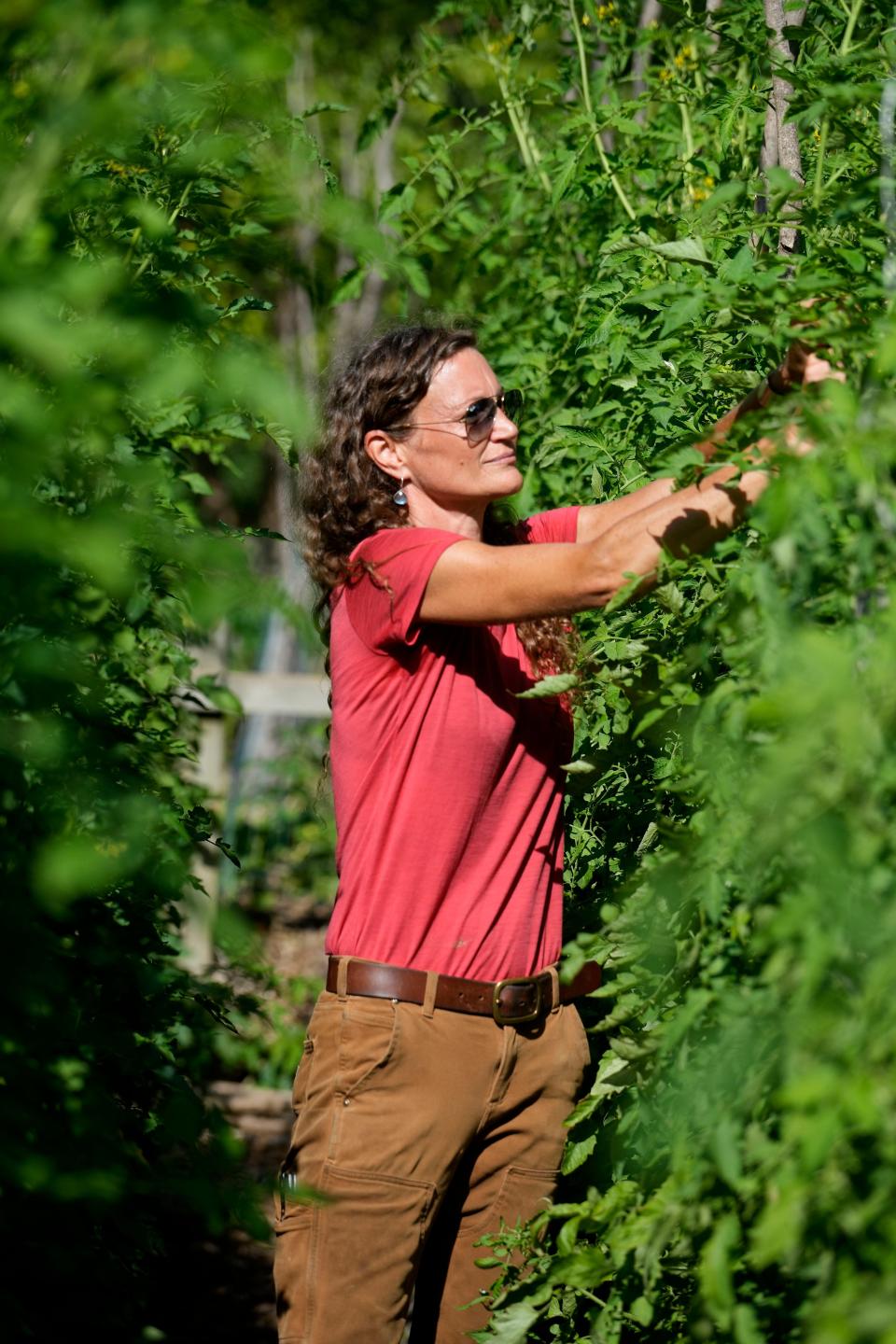
Why did you move to Milwaukee?
I was born and raised here. After I had my son I moved back here to be closer to my parents, my grandmother and other family members. They’re my support system.
Do you ever have help with your business?
Maybe I’ll have help moving compost or help with transplanting. But for most part, I’m a one-woman show.
Where do you get your seeds to start your plants?
I order them online from different online suppliers. Johnny’s Selected Seeds (johnnyseeds.com) has an amazing organic and artisan selection.
What do you grow in your Holy Hill gardens?
Some of the larger, long-season crops like pumpkins, summer squash, and perennials like rhubarb and asparagus. Also things like potatoes, onions, cukes and melons. The things that take up a lot of room.
You have a lot of plants at the end of the year. Do you compost them?
I have three compost piles. I put them as close to the garden plots as possible. I also have worm compost in the basement.
Have you always been interested in gardening?
I wasn’t interested when I was younger. My mom was passionate about flower gardening, but I wanted nothing to do with yard work then.
This article originally appeared on Milwaukee Journal Sentinel: How one single mother grew a business selling the most unusual plants

 Yahoo Finance
Yahoo Finance 